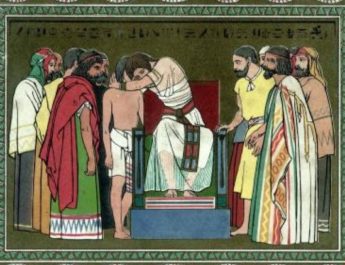Genesis 18:1-10a
Ordinary C34
1 The LordI appearedII to Abraham by the oaksIII of Mamre,IV
I “Lord” = YHVH. From havah (to be, become) or hayah (to come to pass, become, be). This is the name of the God of Israel, the self-existent and eternal one, the tetragrammaton. This pronunciation has been lost to time so “Lord” is generally used in its place.
II “appeared” = raah. This is to see in a literal or figurative sense so stare, advise, think, view.
III “oaks” = elon. 10x in OT. From ayil (strength; things that are strong or powerful: political chiefs, rams, posts, trees, oaks); from the same as ul (mighty, strength, body, belly; root may mean to twist and that implies strength and power). This is terebinth, oak, or another kind of tree that is strong.
IV “Mamre” = Mamre. 10x in OT. Perhaps from mara (to rebel, flap wings, whip, be filthy). This is Mamre a personal name and a place name. It may mean vigor or lusty.
as he satV at the entranceVI of his tentVII in the heatVIII of the day.
V “sat” = yashab. This is to sit and so to remain and so to dwell. It is sitting for any reason – as a judge, in order to ambush, or just sitting quietly. Causatively, this can mean settling or marrying. This can also mean continue, endure, or establish.
VI “entrance” = petach. From patach (to open wide in a literal or figurative sense, loosen, plow, carve). This is opening, door, gate, entrance.
VII “tent” = ohel. Perhaps from ahal (to shine, be clear). This is a tent, covering, home, or side pillar.
VIII “heat” = chom. 14x in OT. From chamam (to be warm, heat; to be hot in a literal or figurative sense; to mate). This is hot or warmth.
2 He looked upIX and sawX, XI threeXII menXIII standingXIV near him.
IX “looked up” = nasa + ayin. Literally “lifted his eyes.” Nasa is to lift in a broad sense, literally and figuratively. So it could be to carry, take, or arise. It could also be bring forth, advance, accept. Ayin is eye in a literal or figurative sense so eye, appearance, favor, or a fountain (the eye of the landscape).
X “saw” = raah. Same as “appeared” in v2. See note II above.
XI {untranslated} = hinneh. From hen (lo! Behold! If, though; an expression of surprise). This is to draw attention, show suddenness or surprise, or to emphasize the importance of the coming statement. See! Lo! Behold!
XII “three” = shalosh. This is three, fork, three times.
XIII “men” = ish. Perhaps from enosh (human, humankind, mortal); from anash (to be weak, sick, or frail). This is man, husband, another, or humankind.
XIV “standing” = natsab. This is to station, appoint, establish, take a stand.
When he saw them, he ranXV from the tent entrance to meetXVI them, and bowed downXVII to the ground.XVIII
XV “ran” = ruts. This is to run or rush, divide quickly, bring swiftly. It can also refer to a footman or guard.
XVI “meet” = qirah. From the same as qara (to happen, meet, bring about). This is any kind of encounter, whether peaceful, hostile, or incidental. It can also mean help or seek.
XVII “bowed down” = shachah. This is to bow down, make a humble entreaty, to do homage to royalty or to God.
XVIII “ground” = erets. Root may mean to be firm. This is earth, ground, field land, or country.
3 He said, “My lord,XIX ifXX I findXXI favorXXII with you,XXIII
XIX “lord” = adon. From a root that means ruling or being sovereign. This is lord, master, or owner.
XX {untranslated} = na. This particle is used for requests or for urging. It can be we pray, now, I ask you, oh. This is the same “na” in “hosanna.”
XXI “find” = matsa. This is to find, catch or acquire. It can also mean to come forth or appear. Figuratively, this can mean to meet or be together with.
XXII “favor” = chen. From chanan (beseech, show favor, be gracious; properly, to bend in kindness to someone with less status). This is grace, favor, kindness, beauty, precious.
XXIII “you” = ayin. Literally “in your sight.” Same as “looked up” in v2. See note IX above.
do notXXIV passXXV by your servant.XXVI
XXIV {untranslated} = na. Same as {untranslated} in v3. See note XX above.
XXV “pass” = abar. This is to pass over or cross over. It is used for transitions, whether literal or figurative. It can also mean to escape, alienate, or fail. This is the root verb from which “Hebrew” is drawn.
XXVI “servant” = ebed. From abad (to work, serve, compel; any kind of work; used causatively, can mean to enslave or keep in bondage). This is a servant, slave, or bondservant.
4 LetXXVII a littleXXVIII waterXXIX be brought,XXX
XXVII {untranslated} = na. Same as {untranslated} in v3. See note XX above.
XXVIII “little” = me’at. From ma’at (being or becoming small, decrease, diminish, pare off). This is a little or few, lightly little while, very small matter.
XXIX “water” = mayim. This is water, waters, or waterway in a general sense. Figuratively, it can also mean juice, urine, or semen.
XXX “brought” = laqach. This is to take, accept, carry away, receive.
and washXXXI your feet,XXXII and restXXXIII yourselves under the tree.XXXIV
XXXI “wash” = rachats. This is to wash, wash away – it can be complete or partial.
XXXII “feet” = regel. This is foot, endurance, or journey. It is a foot as the means of walking and so it implies a step or a greater journey. It can be used euphemistically for private parts.
XXXIII “rest” = shaan. This is to lean or support oneself. So, it can mean to rely or trust.
XXXIV “tree” = ets. Perhaps from atsah (to shut, fasten, firm up, to close one’s eyes). This is tree or other things related to trees like wood, sticks, or stalks. It can also refer to wood products like a plank or staff or gallows. Additionally, this can refer to a carpenter.
5 Let me bring a littleXXXV bread,XXXVI that you may refreshXXXVII yourselves,XXXVIII
XXXV “little” = path. 15x in OT. From pathath (to crumble, open, break). This is a piece, morsel, or fragment.
XXXVI “bread” = lechem. From lacham (to eat, feed on). This is bread, food, loaf. It can refer to food more generally for people or for animals.
XXXVII “refresh” = saad. 12x in OT. This is to support – usually used in a figurative sense. So it is sustain, hold, refresh, comfort, establish.
XXXVIII “yourselves” = leb. May be related to labab (to encourage; properly, to be encased as with fat; used in a good sense, this means to transport someone with love; used in a bad sense, it can mean to dull one’s senses). This is the heart, courage, one’s inner self, the mind, or the will. Heart is only used in a figurative sense in the Old and New Testaments.
and after that you may pass on—since you have comeXXXIX to your servant.”
So they said, “DoXL as you have said.”XLI
6 And AbrahamXLII hastenedXLIII into the tent to Sarah,XLIV and said,
XLII “Abraham” = Abraham. From the same as Abiram (exalted father, a high father – lofty) {from ab (father literal or figurative) + rum (rise, bring up, being high, extol, exalt, haughty; to raise in a literal or figurative sense)}. This is Abraham, father of many nations or father of a multitude.
XLIII “hastened” = mahar. This is being liquid, which implies flowing. So, this word implies hurrying forward, whether in a positive or negative sense.
XLIV “Sarah” = Sarah. From the same as Saray (princess, mistress, noble lady, queen); from sar (chief, ruler, captain, official, prince). This is Sarah, meaning princess.
“Make ready quicklyXLV three measuresXLVI of choiceXLVII flour,XLVIII knead it, and makeXLIX cakes.”L
XLV “quickly” = mahar. Same as “hastened” in v6. See note XLIII above.
XLVI “measures” = seah. 9x in OT. This is a seah, used to measure flour or grain – about 7 quarts.
XLVII “choice” = soleth. This is fine flour.
XLVIII “flour” = qemach. 15x in OT. Root perhaps meaning to grind. This is something ground, such as flour, meal, or grain.
XLIX “make” = asah. Same as “do” in v5. See note XL above.
L “cakes” = uggah. 7x in OT. Perhaps from ug (to gyrate, bake; baking a round cake). This is a bread cake that is round, cooked on the hearth.
7 Abraham ran to the herd,LI and tookLII a calf,LIII tenderLIV and good,LV
LI “herd” = baqar. From baqar (to plow, break forth; figuratively, to inquire, inspect, consider). This is cattle – an animal used for plowing.
LII “took” = laqach. Same as “brought” in v4. See note XXX above.
LIII “calf” = ben + baqar. Literally “son of a cow.” Ben is from banah (to build or obtain children). This is son, age, child. It is son in a literal or figurative sense. Baqar is the same as “herd” in v7. See note LI above.
LIV “tender” = rak. 16x in OT. From rakak (to be tender, soft, faint, weak; to soften or mollify). This is tender in a literal or figurative sense. It could be delicate, gentle, inexperienced, refined, soft, or weak.
LV “good” = tob. From tob (to be pleasing, to be good). This is good, beautiful, pleasant, agreeable, bountiful, at ease. This word is used for goodness as a concept, a good thing, a good person. This can refer to prosperity and welfare as well as joy, kindness, sweetness, and graciousness. So, this is ethically good, but also enjoyably good.
and gaveLVI it to the servant,LVII who hastened to prepareLVIII it.
LVI “gave” = natan. This is to give, put, set, offer. It is to give literally or figuratively.
LVII “servant” = naar. May be from na’ar (to shake, toss up and down, tumble around). This is a child or a servant. It is a child in their active years so they could be aged anywhere from infancy to adolescence.
LVIII “prepare” = asah. Same as “do” in v5. See note XL above.
8 Then he took curdsLIX and milkLX and the calfLXI that he had prepared,
LIX “curds” = chemah. 10x in OT. Perhaps from the same as chomah (a wall for protection); from the same as cham (father-in-law – one’s husband’s father; perhaps from a root meaning to join). This is milk products like curds, butter, or cheese.
LX “milk” = chalab. Perhaps from the same as cheleb (fat, finest, marrow; fat in a literal or figurative sense; the richest or best part). This is milk or cheese or suckling.
LXI “calf” = ben + baqar. Literally “son of a cow.” Same as “calf” in v7. See note LIII above.
and setLXII it beforeLXIII them; and he stoodLXIV by them under the tree while they ate.LXV
9 They said to him, “Where is your wifeLXVI Sarah?”
And he said, “There,LXVII in the tent.”
LXII “set” = natan. Same as “gave” in v7. See note LVI above.
LXIII “before” = paneh. Literally “before their faces.” From panah (to turn, face, appear). This is face in a literal or figurative sense. It could be face, presence, anger, respect. It can also be used of God to indicate divine favor or presence.
LXIV “stood” = amad. This is to stand up in a literal or figurative sense. So it can be establish, continue, endure, take a stand, act, be a servant, stand still, remain, stand against an enemy.
LXV “ate” = akal. This is to eat, devour, burn up, or otherwise consume. It can be eating in a literal or figurative sense.
LXVI “wife” = ishshah. Related to “men” in v2. Perhaps from ish (see note XIII above). This is woman, wife, or female.
LXVII “there” = hinneh. Same as {untranslated} in v2. See note XI above.
10 Then one said, “I will surely returnLXVIII to you in dueLXIX season,LXX andLXXI your wife Sarah shall have a son.”LXXII And Sarah was listeningLXXIII at the tent entrance behind him.
LXVIII “surely return” = shub + shub. To turn back, return, turn away – literally or figuratively. Doesn’t necessarily imply going back to where you started from. This is also the root verb for the Hebrew word for repentance “teshubah.” The word is repeated twice – the first time as an Infinitive Absolute. The Infinitive Absolute serves to emphasize the sentiment of the word. It is rather like Foghorn Leghorn’s speech pattern, “I said, I said.”
LXIX “due” = chay. From chayah (to live or keep alive literally or figuratively). This is alive, living, lifetime. It can also be used to describe someone’s age. It can refer to animals, plants, water, or a company or congregation of people. It is life in a very broad sense.
LXX “season” = et. Probably from anah (to answer, sing, announce); from ad (forever, all, old); from adah (to pass on, advance, decorate oneself). This is a period or season. It can also mean whenever or continually.
LXXI {untranslated} = hinneh. Same as {untranslated} in v2. See note XI above.
LXXII “son” = ben. Same as “calf” in v7. See note LIII above.
LXXIII “listening” = shama. This is to hear, call, consent, or consider. It implies listening intelligently, giving attention, and, because of these two factors, obedience and action are often implied.
Image credit: “Abraham, Father of Faith” by YoMinistry




